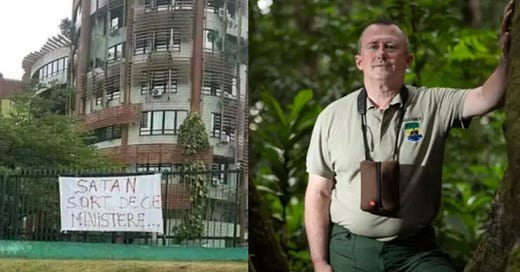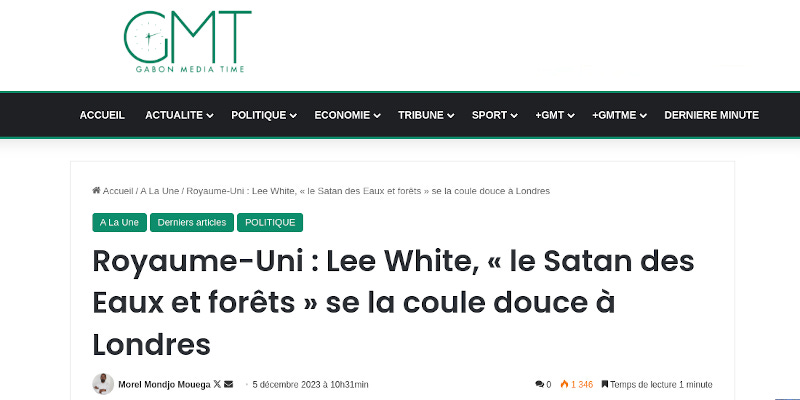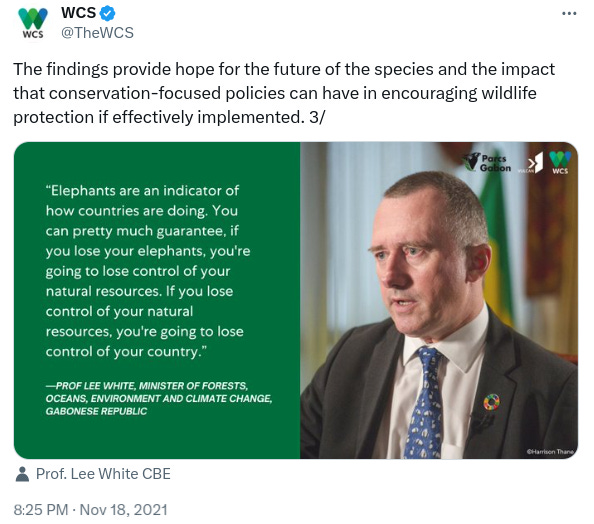Gabon’s media calls Lee White, “Satan of the Waters and the Forests”
Lee White, ex-forestry minister of Gabon, recently gave an interview to The Times.

Following the August 2023 coup d’état in Gabon, Lee White lost his job as Minister of Water, Forests, the Sea, and Environment. He left the ministry to a crowd of people chanting, “Voleur, voleur, voleur!” “Thief, thief, thief!”
In October 2023, Climate Home News reported that White had been arrested and placed under house arrest. White and three other officials were accused of “misappropriation of public funds, forgery and use of forgery, extortion, association of criminals, violation of procedures for awarding forestry permits, complicity in illegal logging, removal of parts and money laundering”.
But a couple of days later, White left Gabon and returned to the UK.
In a recent interview with The Times, from a village near St Andrews, White said that,
“So they basically threw the kitchen sink at me and accused me of being a mafia kingpin but then said: ‘You are perfectly welcome to go to Scotland if you want to’.”
He admitted to having been “quite stressed” after the coup.
“I didn’t fear for my life. I was . . . quite stressed for a period of about a month when it looked like I might end up spending the next few years of my life in a prison in Gabon. But I think that that would have been the worst of it.”
Two months after he had flown back to the UK, a Gabonese website called White the “Satan of the Waters and the Forests”:
White in Gabon, backing the Bongo regime
White first moved to Gabon in 1989 to carry out research for his PhD at Edinburgh University. He worked in Gabon for 15 years with the Wildlife Conservation Society. He persuaded president Omar Bongo to create 13 national parks covering a total of 11% of the country.In 2009, he became head of Gabon’s National Parks Agency, and in 2019, Minister of Forests.
Omar Bongo was president of Gabon for more than 40 years before his death in 2009. During his authoritarian rule, Bongo became one of the wealthiest leaders in the world. He owned a series of mansions in France and the US, and at least 186 cars. He bought his wife a Mercedes Maybach.
When Omar Bongo died, his son Ali Bongo took over. A 2020 report by the Organized Crime and Corruption Reporting Project revealed that the Bongos and their inner circle had bought “at least seven properties worth over US$4.2 million in and near the U.S. capital”.
Following the elections in 2016, government forces shot and killed dozens of opposition supporters.
In the interview with The Times, White dismissed criticism of the brutal regimes for which he worked. He said that,
“In every African election, the opposition always claims that it was rigged. It’s not always rigged but it’s just the dogma that the opposition feel that they cannot lose.”
In September 2023, the International Consortium of Investigative Journalists (ICIJ) reported that the coup in Gabon “marked the end of over half a century of unbroken dynastic rule during which the Bongo family accumulated enormous wealth both at home and offshore”.
While the Bongo family became extremely rich, the vast majority of the people of Gabon did not benefit. ICIJ wrote that,
Though Gabon is rich in oil and defined as a middle-income country, at least a third of the population is impoverished and unemployment is rife.
“I have no choice,” White said, when The Times asked how he justified working with the Bongo family. “Gabon is my country. I became Gabonese back in 2008.”
“My mission in life was to preserve and sustainably develop the rainforest, so I wasn’t seeing myself as a Brit who was propping up the regime. I was seeing myself as a Gabonese person working within the system. It was the system I found in Gabon. It was a system that obviously now changed and there’s a new system.”
This is astonishingly naive. The obvious reality is that White has, time and time again, backed the Bongo regime. He has argued that Ali Bongo was “committed to conservation”. And he has even described Omar and Ali Bongo as “remarkable heads of state”.
“Lee’s elephants”
Some of White’s conservation measures were unpopular in Gabon. People were evicted when the national parks were created. A zoologist who saw the marginalisation of communities living in and near the new national parks told Le Monde that, “Conservation was achieved at the expense of the local communities.”
In May 2021, an eco-guard was shot dead in Mekambo in the northeast of Gabon. The Ministry of Forestry claimed that the murderer was a poacher, although it provided no evidence for this.
For several weeks Mekambo had seen demonstrations by villagers angry that their crops had been destroyed by elephants.
Mekambo was not the only place were tensions were rising, according to a report by Le Monde. The situation was worsened by the authorities’ failure to take any action to protect villagers from the elephants, apart from a few electric fences.
White had little sympathy with the people affected by elephants, and was more concerned about control over “natural resources”:
“Elephants are an indicator of how countries are doing. You can pretty much guarantee, if you lose your elephants, you’re going to lose control of your natural resources. If you lose control of your natural resources, you’re going to lose control of your country.”
Eventually, in May 2022, White announced that the government had included US$5 million in its budget as compensation for farmers whose crops were destroyed by farmers.
The elephants were nicknamed “Lee’s elephants”.
One villager told Le Monde that,
“The Americans give money to save the elephants, but we have nothing. They came last night, they devastated everything. My two taro and banana plantations have been trampled, what will I do now to feed my children?”
Marc Ona Essangui is the founder of the Gabonese NGO Brainforest. In 2009, he won the Goldman Environmental Prize for his work exposing the illegal agreements behind a US$3.5 billion mining development project. In 2013, he was given a six-month suspended sentence for defamation and a fine of almost US$10,000.
Ona Essangui told Le Monde that,
“The protection of wildlife continues to be imposed in a repressive manner, while, in the countryside, populations have nothing. No access to electricity, no access to health, and agriculture is their only means of subsistence.”
In May 2021, water and forestry officials went on strike demanding their unpaid salaries. A banner stretched between two trees at the ministry read, “Satan, get out of our house!”
Ecoguards at the National Agency for National Parks also went on strike demanding to know what had happened to the contributions to their pension fund.
Gabon’s REDD dreams
In mid-2022, White announced that Gabon would create 187 million carbon credits. White told Bloomberg that he hoped that 90 million of these credits would “come on to market just before COP27”.
Bloomberg commented that,
The number of carbon credits Gabon aims to sell on the market could be worth about $291 million based on the average price for similar projects calculated by Allied Offsets, a carbon offsets data provider. Such a large issuance, if done all at once, could flood the $1 billion market.
That assumes a price per credit of US$3.23. White, it seems, was hoping for considerably more than this. In October 2022, White told Quantum Commodity Intelligence that Gabon was looking for between US$25 and US$30 per credit. He claimed that there was “definite interest” around US$15-16 for “millions or hundreds of thousands of credits”.
White told The Times that the credits should have earned US$1,015 each. “We were never paid,” White said. “The developed nations never respected their engagements in Copenhagen and Paris and Glasgow.”
White took part in a meeting at COP28 in Dubai, organised by the Coalition for Rainforest Nations. He accused rich countries of “failing forests”.
But as Rainforest Foundation UK pointed out in a 2023 report that included a detailed analysis of how Gabon actually generated its carbon credits, the reality was that,
In terms of lack of additionality, inflated baselines, inflated accounting and leakage, the credits being offered for sale by Gabon may be worthless as a means of compensating for real emissions occurring elsewhere.







Re: the quote above: "the credits being offered for sale by Gabon may be worthless as a means of compensating for real emissions occurring elsewhere." Does this not apply to ALL carbon credits? Has ANY carbon credit ANYWHERE ever compensated for any emission at all, anywhere?
Great research, thanks for posting!
"This is astonishingly naive" - do you think it is more or less naive than the blind acceptance of negative statements made about the previous administration in media now controlled by the military? Wouldn't it be more new worth and surprising if these kinds of accusations WEREN'T made?